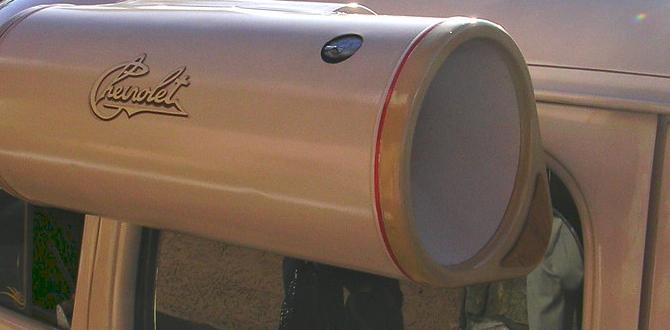Planning a Blue Mountains road trip base guide is your key to an unforgettable adventure. This guide provides essential tips for choosing the perfect starting point, packing smart, and ensuring a comfortable, stress-free journey for everyone, including those needing travel-friendly support.
Dreaming of majestic waterfalls, ancient rainforests, and breathtaking views? The Blue Mountains are a world-class destination, but planning a road trip there can feel a little overwhelming. Where do you start? What should you pack? How do you ensure the whole family, young or old, has a comfortable and enjoyable experience? Don’t worry! With a little preparation, you can transform your Blue Mountains adventure from a potential hassle into a seamless, memorable journey. This guide is designed to break down the essentials, making it easy for you to create your perfect road trip base.
We’ll cover everything from picking the ideal ‘base camp’ for your explorations to packing like a pro, with special considerations for ensuring comfort and ease for all travelers. Get ready to embrace the wild beauty of the Blue Mountains with confidence!
Choosing Your Blue Mountains Road Trip Base
Selecting the right base is crucial for any road trip. For the Blue Mountains, this means choosing a town or area that gives you easy access to the sights you want to see, offers comfortable accommodation, and has the amenities you need. Think of your base as your home away from home, your launchpad for daily adventures.
Popular Base Towns and Their Vibes
The Blue Mountains region is dotted with charming towns, each offering a unique charm and proximity to different natural attractions. Here’s a quick look at some popular choices:
- Katoomba: Often considered the heart of the Blue Mountains, Katoomba is famous for the iconic Three Sisters. It’s a bustling hub with a wide range of accommodation, restaurants, and shops. It’s ideal if you want to be close to major lookouts and enjoy a lively atmosphere.
- Leura: Just a short drive from Katoomba, Leura offers a more peaceful and picturesque experience. It’s known for its elegant main street filled with boutiques, cafes, and gardens. It’s perfect for those seeking a relaxed base with easy access to beautiful walks.
- Blackheath: Situated at a higher altitude, Blackheath offers cooler temperatures and a distinct, slightly more rugged feel. It’s a haven for hikers and nature lovers, providing access to some of the region’s most stunning and less-crowded trails.
- Springwood: Located closer to Sydney, Springwood is a great option if you want a shorter drive to the mountains. It’s a busy commercial center with more budget-friendly accommodation options and a good starting point for exploring the eastern side of the Blue Mountains.
- Wentworth Falls: Named after its magnificent waterfall, this town is a dream for nature enthusiasts. It’s quieter than Katoomba and Leura, offering a more serene stay while still being close to incredible natural wonders.
Factors to Consider When Choosing Your Base
Beyond the town’s personality, other factors play a big role in making your trip comfortable:
| Factor | Why it Matters | Consider This |
|---|---|---|
| Proximity to Attractions | Saves travel time and maximizes exploration. | Are you keen on the Three Sisters, bushwalking trails, or scenic drives? Check maps! |
| Accommodation Options | Ensures comfort and fits your budget. | Look for hotels, B&Bs, self-contained cottages, or caravan parks. Book in advance, especially during peak seasons. |
| Amenities & Services | Convenience for supplies, food, and support. | Does the town have a supermarket, pharmacy, doctor’s clinic, or good restaurants? |
| Transport Links | Ease of getting around without your car if needed. | Is it easily accessible by train? Are there local buses for getting to trailheads? |
| Vibe & Atmosphere | Matches your travel style. | Do you prefer a lively town center or a quiet, secluded retreat? |
The Importance of Booking in Advance
The Blue Mountains are incredibly popular, especially during school holidays, long weekends, and the autumn foliage season. Accommodation, from cozy B&Bs to family-friendly hotels, can fill up months in advance. Booking your base and any specific tours or activities early is essential for securing your preferred stays and avoiding disappointment.
Essential Packing for Your Blue Mountains Road Trip
Packing smart is key to enjoying your Blue Mountains adventure. The weather can be unpredictable, and you’ll want to be prepared for clear skies, sudden rain, and cooler mountain air. Comfort and practicality are your best friends here.
Layers Are Key
The mountain air can be significantly cooler than on the coast, and conditions can change rapidly. Dressing in layers allows you to adjust to the temperature throughout the day.
- Base Layer: Moisture-wicking fabric like merino wool or synthetic materials to keep you dry.
- Mid Layer: A fleece or insulating jacket for warmth.
- Outer Layer: A waterproof and windproof jacket is a must.
Footwear Matters
You’ll likely be doing a lot of walking, whether on paved paths, boardwalks, or rugged trails. Comfortable, supportive shoes are non-negotiable.
- Hiking Boots/Shoes: If you plan on serious bushwalking. Ensure they are well broken-in to avoid blisters.
- Sturdy Walking Shoes: For less strenuous walks and exploring towns.
- Comfortable Sandals or Flip-flops: For relaxing at your accommodation.
What to Carry on Day Trips
Always pack a small daypack for your excursions. This ensures you have essentials handy without needing to return to your base.
- Water Bottle: Hydration is vital, especially when active. Reusable bottles are eco-friendly.
- Snacks: Energy bars, fruit, or nuts are great for keeping you going between meals.
- Sun Protection: Sunscreen, a wide-brimmed hat, and sunglasses. The sun can be strong even on cloudy days.
- Insect Repellent: Especially useful during warmer months and near water sources.
- First-Aid Kit: For minor scrapes or blisters. Include bandages, antiseptic wipes, pain relievers, and any personal medications.
- Map and Compass/GPS: Essential for bushwalking, even on marked trails. Download offline maps if relying on your phone.
- Fully Charged Phone & Power Bank: For navigation, photos, and emergencies.
- Camera: To capture those incredible views!
Special Considerations for Comfort and Ease
Travel should be comfortable for everyone, regardless of age or personal needs. For families or individuals who require extra support, planning ahead can make a world of difference. This is where practical solutions for personal care come into play, ensuring dignity and freedom.
For adults and children who may need urinary or fecal incontinence products, choosing the right kind of adult diapers or child diapers is important for a stress-free trip. Look for products that offer:
- High Absorbency: To provide security and prevent leaks, especially on longer journeys or hikes.
- Comfortable Fit: Breathable materials and a snug, discreet fit to prevent chafing and allow for all-day wear.
- Odor Control: To maintain confidence and freshness.
- Ease of Changing: Products that are easy to use and change, whether in a car, a public restroom, or a picnic spot.
Brands like Depend adult diapers or specialized child diapers are designed with these features in mind. Packing a sufficient supply, along with disposal bags and wipes, will ensure that personal care needs don’t hinder your exploration of the Blue Mountains. It’s all about enabling freedom and confidence, allowing you to focus on the amazing natural beauty around you.
Navigating the Blue Mountains by Car
Your road trip base guide wouldn’t be complete without advice on getting around once you’re there. The car is your best friend for exploring the diverse landscapes of the Blue Mountains, but knowing how to navigate the roads and parking situations will save you time and hassle.
Road Conditions and Driving Tips
The main roads through the Blue Mountains, like the Great Western Highway, are generally well-maintained and sealed. However, some scenic drives or routes to popular trailheads might be on unsealed or gravel roads. Always:
- Drive to Conditions: Especially after rain, roads can become slippery, and visibility can be reduced.
- Be Aware of Wildlife: Kangaroos and wallabies are common, particularly at dawn and dusk. Drive slowly and be prepared to stop suddenly.
- Watch for Cyclists and Pedestrians: Many people visit the Blue Mountains to walk and cycle.
- Fuel Up: While larger towns have plenty of service stations, smaller villages may have limited options. It’s wise to keep your fuel tank reasonably full.
- Check for Road Closures: Especially after severe weather events, sections of road can be temporarily closed. Stay updated through the Transport for NSW website.
Parking at Popular Attractions
Parking can be a challenge at the most popular lookouts and trailheads, especially on weekends and holidays. Many major sites, such as Echo Point (for the Three Sisters) in Katoomba, have dedicated car parks. However, these can fill up quickly.
- Arrive Early: The best way to secure a parking spot is to arrive as early in the morning as possible.
- Consider Parking Further Away: Don’t be afraid to park in a nearby street or a slightly further car park and enjoy a short walk.
- Utilize Public Transport: For some popular spots, like the Prince Henry Cliff Walk, you might be able to park in the town center and walk to the attraction.
- Be Patient: If you can’t find a spot immediately, circle around or wait a little while for someone to leave.
Using Navigation Apps
GPS navigation apps like Google Maps or Waze are invaluable. However, cell service can be patchy in some parts of the mountains. It’s highly recommended to:
- Download Offline Maps: Before you leave your accommodation or a town with good signal, download the relevant map areas. This ensures you can navigate even when you lose reception.
- Have a Co-Pilot: If possible, have a passenger manage the navigation so the driver can focus on the road.
Planning Your Blue Mountains Itinerary
With your base sorted and your packing list ready, it’s time to think about what you want to do! The Blue Mountains offer a vast array of experiences, from iconic viewpoints to hidden gems.
Must-See Attractions
Even for a short trip, some sights are unmissable:
- Echo Point Lookout (Katoomba): The prime spot for iconic views of the Three Sisters. Arrive early to beat crowds.
- Scenic World (Katoomba): Offers a variety of attractions including the Scenic Railway (steepest passenger railway in the world), Scenic Cableway, Scenic Skyway, and the Furber Steps walk. Great for families. (Check their website for current operating status and tickets).
- Wentworth Falls: A stunning waterfall accessible via short walks from the picnic area. The views are spectacular.
- The Grand Canyon Track (Blackheath): A moderately challenging walk through a beautiful canyon. Requires good footwear and moderate fitness.
- Hargreaves Lookout & Dry Tunnel (Blackheath): Offers expansive views, especially at sunrise or sunset.
Bushwalking Trails for All Levels
The Blue Mountains are a bushwalker’s paradise. There’s a trail for everyone:
- Easy: Prince Henry Cliff Walk (Katoomba to Leura, or sections of it), Leura Cascades, National Pass (currently partially closed, check status).
- Moderate: The Grand Canyon Track (Blackheath), Wentworth Falls Picnic Area walks (e.g., to Frederick Falls).
- Challenging: Six Foot Track (multi-day), Mount Victoria to Boyd’s Ridge.
Always check the NSW National Parks website for trail status, closures, and detailed descriptions.
Seasonal Considerations
The Blue Mountains beautiful in every season, but each offers a different experience:
- Spring (Sept-Nov): Wildflowers bloom, and the weather is generally pleasant for walking.
- Summer (Dec-Feb): Warmer days, but can also bring thunderstorms. Good for waterfall visits.
- Autumn (Mar-May): Famous for its stunning golden and red foliage, especially in Leura and Blackheath. Crisp, cool air perfect for hiking. This is a very popular time.
- Winter (Jun-Aug): Cold, crisp air, often shrouded in mist and fog, creating a dramatic, moody atmosphere. Can be magical, but requires warmer clothing.
Activities Beyond Hiking
If hiking isn’t your only focus, consider:
- Exploring the Towns: Indulge in cafes, local crafts, and art galleries in Leura and Blackheath.
- Tours: Guided walks, photography tours, or even Aboriginal cultural experiences.
- Scenic Drives: Wind your way along the Bells Line of Road or explore the less-traveled mountain roads.
Ensuring a Stress-Free Journey for All Travelers
A truly great road trip is one where everyone feels comfortable and included. Beyond the practicalities of navigation and attractions, consider the well-being of all members of your group.
Comfort on the Road
Long drives can be tiresome. Plan for regular breaks to stretch legs and refresh. Comfortable seating is also important. Many modern cars offer lumbar support, but consider a travel pillow for added neck or back support. For those who need extra personal care, like adults or children using incontinence products, having these readily accessible in the car is vital. Changing facilities can be scarce, so planning for comfort and discretion is paramount. Having a dedicated bag with supplies – such as a few pairs of adult diapers or child diapers, wet wipes, and disposal bags – makes quick stops much easier.
Managing Personal Care Needs
This is a crucial aspect that often gets overlooked in generic travel guides. For individuals managing incontinence, whether temporary or long-term, accessible and reliable adult diapers or child diapers are essential. When choosing products, look for:
- Discretion: Products that fit well and are not bulky can help users feel more confident.
- Reliability: High absorbency and secure fastenings prevent leaks, which is especially important when you’re away from home.
- Skin Health: Breathable materials and gentle formulations help prevent irritation.
Brands like Tena adult diapers or specialized children’s pull-ups offer good options. Planning your stops around places with restrooms can help, but having the means to manage needs independently in the car or at a rest stop provides immense peace of mind. Remember to pack more than you think you’ll need. A small, portable changing mat can also be a lifesaver.
Involving the Whole Family
When traveling with children, or even older





